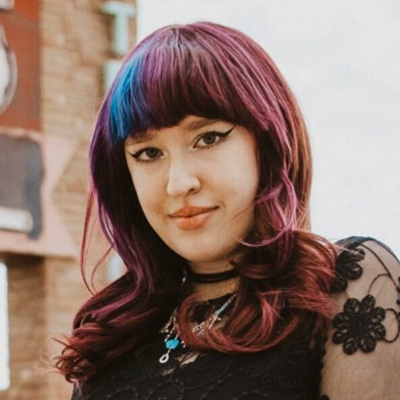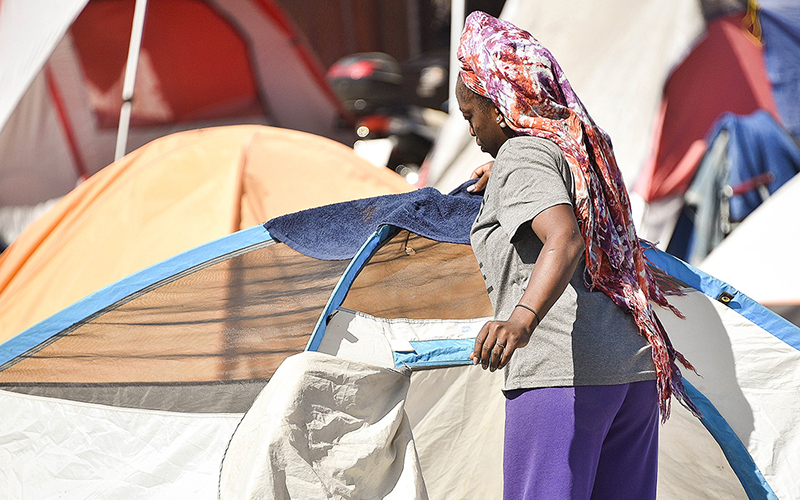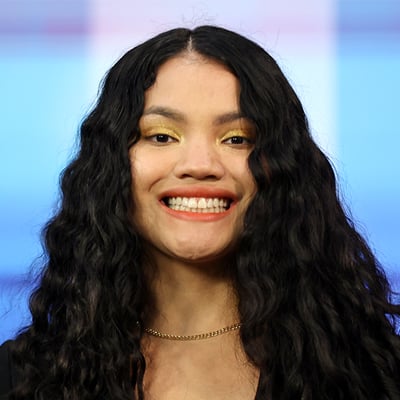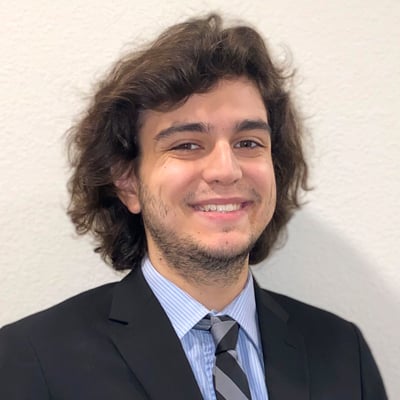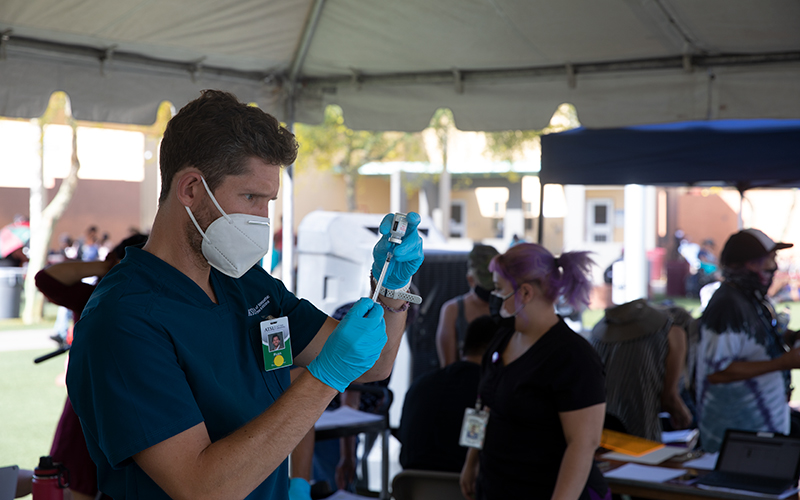
A medical volunteer prepares a dose of the Moderna COVID-19 vaccine on April 13 at the Human Services Campus in downtown Phoenix. Circle the City held a five-day event at the campus with the goal of vaccinating 500 people experiencing homelessness. (Photo by James Paidoussis/Cronkite News)
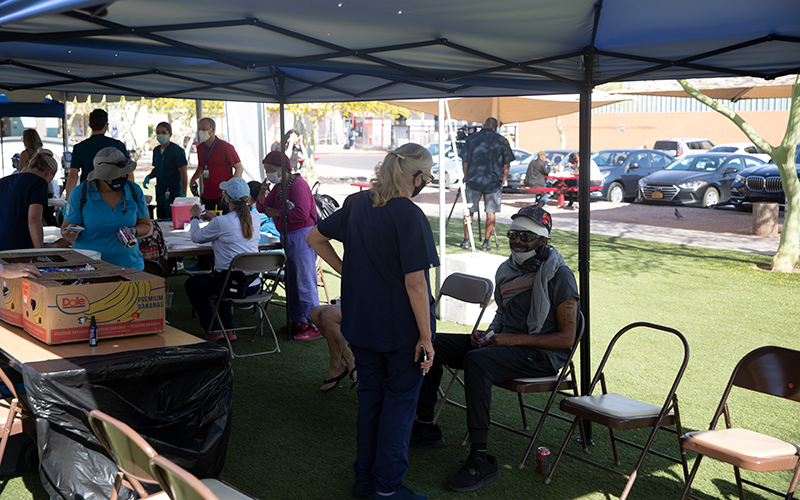
A vaccine recipient is observed by medical volunteers during a downtown Phoenix event for those experiencing homelessness. Recipients waited in the observation area so staff could watch for any adverse reactions. Food and water were provided. (Photo by James Paidoussis/Cronkite News)
PHOENIX – A local nonprofit organization is working to ensure that one of Arizona’s most vulnerable groups gets a shot at being vaccinated against COVID-19.
Circle the City provides health care for more than 7,000 people experiencing homelessness in Maricopa County. Since January, the group has been vaccinating this population through clinics and special events, administering about 4,000 vaccinations so far.
“I’m totally grateful, because I didn’t think I was going to be able to get it because I had no computer and I don’t have a smartphone and everything was sign-up. Well, I came down here, and I got my shot,” vaccine recipient Debra Fuchs said at one recent event at the downtown Human Services Campus, a 13-acre complex housing groups that address homelessness.
That five-day vaccination drive, held in April, was a collaboration among Circle the City, the Human Services Campus and the Maricopa County Human Services Department.
“We need to meet people where they are,” said Kim Despres, interim CEO of Circle the City. “We need to go where they live, where they sleep. So this is a perfect place to reach out to meet as many people as we can.”
Dr. Aaron Allgood, internal medicine physician with the organization, said the effort goes beyond shots in arms.
“Part of what we’re doing here is giving them the vaccine, but also helping them get connected with a clinic for continuity of care,” he said.
In many cases, individuals who are experiencing homelessness have no contact with health clinics and don’t know where to go for basic medical care. They may also lack access to computers, cars and cellphones, putting them at greater risk of adverse health outcomes – worsened by the COVID-19 pandemic.
People experiencing homelessness are at higher risk for COVID-19 because of underlying health risks, lack of access to hygiene facilities and because they may live in congregate settings, such as shelters.
Despite that, just 25 states explicitly prioritized residents in homeless shelters for vaccine allocation, according to a report by the Kaiser Family Foundation. Arizona and five other states prioritized people living in congregate settings but did not specify whether that included homeless shelters.
On any given night, about 580,000 people in the U.S. are experiencing homelessness, or about 18 out of every 10,000 people, according to federal data. That includes nearly 11,000 people in Arizona.
The CARES Act of 2020 included $4 billion to protect homeless people during the pandemic, but funding delays and confusing spending restrictions hampered communities’ ability to utilize that aid, according to a report by the Howard Center for Investigative Journalism.
Marty Hames, spokesperson for Circle the City, said the nonprofit did what it could to help, providing COVID-19 testing throughout the pandemic and then launching vaccinations in mid-January for those with preexisting conditions or comorbidities before expanding the effort.
“We finally decided that the time had come where we needed to really open an event where there was no appointment necessary, that people can just walk up if they want the vaccine … and we wanted to make it as easy as possible for them,” Hames said.
Circle the City, funded by grants and other contributions, is continuing vaccination through outpatient clinics and mobile medical outreach.
“Rather than asking them to come to us and getting a car to drive to get to a location or needing a computer to make an appointment, instead we come to them to provide those services,” Hames said. “We try to take away all those barriers so that they can get the same health care services that everybody else is getting.”
Maurice Freeman, who’s been homeless since October, received his second vaccine dose from Circle the City.
“The health care is wonderful here,” Freeman said. “I’m almost 65 years old. I’ve still got a hard head and think that I’m young again, but the only way you’re going to feel young and be able to combat all these things that life has sent your way is to get vaccinated and take care of your health.”
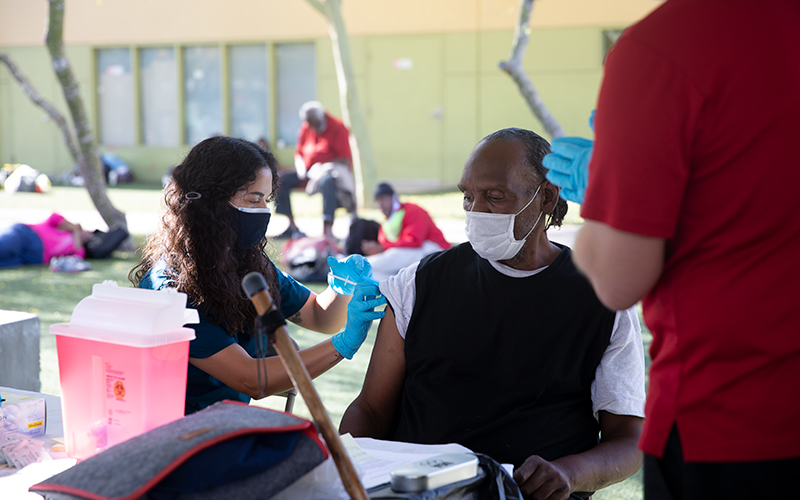
Maurice Freeman receives his second dose of a COVID-19 vaccine at an event in downtown Phoenix. Freeman, who has been homeless since October, comes to the Human Services Campus for medical attention and shelter. (Photo by James Paidoussis/Cronkite News)
